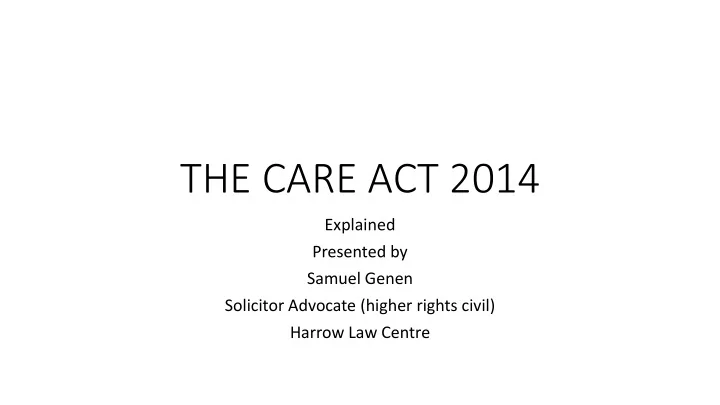

THE CARE ACT 2014 Explained Presented by Samuel Genen Solicitor Advocate (higher rights civil) Harrow Law Centre
Part 1 Responsibilities of Local Authority • General duties to promote “well - being” the list: • Personal dignity • Physical and mental health and emotional well-being • Protection from abuse and neglect • Independence • Work & education • Social and economic Well-being • Includes family and personal relationships • Suitability of living accommodations • Contribution to society
Responsibilities continued • LA must consider the importance of each matter • The individual's views, feelings and beliefs (EqA compliant?) • Preventing delays to meeting care needs • Looking at the whole picture • Looking at the individual • Balancing the two (money £££) • The positive requirement to protect people from abuse and neglect • Restrictions on freedom is kept to a minimum ( Cheshire west )
What is provided by the Local Authority? • Accommodation • Care and support at home and in community • Counselling and social work • Goods and facilities • Information advice and advocacy
What is provided by the NHS/CCG? • Nursing Care • Medical care • Medical Facilities (medical equipment) • Special hospital beds
Assessing needs for those requiring CARE • Where there appears there may have needs the LA must assess. • Doesn’t matter about £ or level of need! • Must be outcome focused and consider impact on individual • Must involve carer and any person who should be involved if individual lacks capacity • Carry out assessment of Carer’s needs • LA can refuse to undertake assessment if… • Person refused carer or individual (exceptions for capacity matters)
Is a person eligible? • Is the individual: • Physically or mentally impaired? • Unable to meet specified outcomes? • Have something that impacts that is significant on the adult’s well -being • Specified outcomes • Eating - cleaning the house • Hygiene - developing relationships • Managing toilet needs - accessing facilities • Getting dressed - caring for their child • Accessing and engaging in work and education
The question you must ask… • Are they unable to achieve without assistance • Is able to achieve without but at significant pain distress or anxiety • Does the action endanger their safety • Can do the action but takes significantly longer..
Duty to meet the needs identified (for care) • There are exceptions but be aware of problems • Ordinary residence? • foreign national/EEA? • Financial limit on care
Case studies Ms S • Ms S came from Poland to the UK in 2012. She was diagnosed with Alzheimers in Poland. She has since been in the care of her daughter and son-in-law. Over the years her condition has declined significantly, whereas she was previously manageable the in family home her condition has made her behaviour unmanageable. Ms S condition will be considered entirely unmanageable after the family has a third child. • Her behaviour has become erratic, on one occasion the police were called as her son-in-law was concerned about restraining her. As two children live in the family home this should give increased concern for those assessing in respect of admitting her into residential care. Finally her attendance at a day centre has been cut short due to funding issues in April 2015.
Ms S continued • As Ms S is Polish, she is an EEA national exercising her treaty rights. There is nothing that precludes an assessment nor support under schedule 3 NIAA 2003. The statutory guidance of the Care Act 2014 is silent on this issue. When undertaking the s.21 analysis it is clear that our client will suffer a breach of her convention/charter rights should support not be provided.
Conclusion • The Care Act: • Consolidates lots of legislation • Gives very broad powers to the LA • Empowers carers and those receiving care • Helps safeguard the most vulnerable in society The Law Centre undertakes: community care, court of protection and public law work.. Please contact Samuel Genen or Gail Bradford for more information. Telephone: 02088634355
Recommend
More recommend